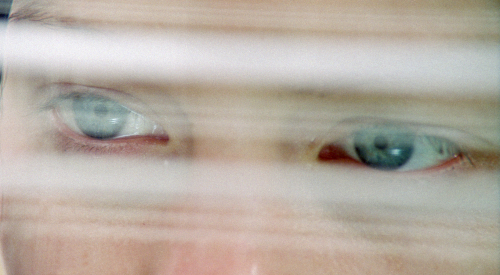Salla Tykkä’s short films, featuring female protagonists almost exclusively, thematically try to map the issues of the female psyche and a fundamentally feminine life experience.
Recollection is a key element in Tykkä’s creative process, and not solely because of the autobiographical aspects. According to her artistic interpretation, the act of remembering is similar to watching or even creating a movie that we play in our heads for a single viewer – ourselves. Thus, they become memories of our dreams in film-like scenes.
Her short film Retrospective is based on remembrance as an active, conscious action. In the video, Tykkä looks back on her path on her entire career by making a subjective inventory of the most important tools of her career: the camcorders and cameras that have accompanied her throughout the years.
Her earliest works presented at the exhibition go back to the artist’s university year, eg. My Hate is Useless (1996) and Still (1999) that are oftentimes perceived as self-therapy tools. The central theme of these films – body image, physical and psychological self-acceptance, compulsive control of the body, and fears relating to the female body as individual and collective construct – also served as background for later works.
Control over one’s body in its most immediate manifestation, exercise or sport, is prevalent in Tykkä's work. We often encounter her characters engaged in some kind of sporting activity or physical exertion. In her short Giant, sport has a central role, as we receive a glimpse into the disciplined and restrictive life in Romanian all-girls' boarding schools for gymnastics. The film Airs Above the Ground follows the purposeful taming process and overruling of an explosive, powerful living creature via the dressage of the Lipizzaner. The perfect aesthetic, and subtly sophisticated physicality – the result of careful selection and long years of hard work - become the symbol of civilised control over the primordial power of the living body.
In a considerable number of Tykkä’s films, language, especially the spoken word, is rendered secondary. Even though the viewer’s reception is usually helped along by a few brief words, written remarks, or thoughts, meaning is mostly conveyed by the powerful images, or actions outlined with decisive gestures, iconic soundtracks, and film genre references.
Tykkä’s videos seen at the exhibition never stray from images or stories that could easily occur in real life. Despite the painstakingly realistic nature of her imagery, the films are surrounded by a peculiar surrealistic atmosphere with a mysterious, almost malicious foreboding.
Tykkä often uses the most sophisticated soundtracks, which automatically cast the viewer into the world of the given genre, awakening our expectations specific to the type of film in question, which she then destroys with decisive means.
In her 1999 work Power, the artist underlines the male-female power relationship as represented by a staged fight between a petite young woman - the artist herself - and a beefy male boxer, also drawing on the father-daughter relationship. By applying the instantly recognisable soundtrack of the 1976 box classic, Rocky, Tykkä calls on the clichés of the popular genre.
Tykkä's short film Lasso (2000) loans a musical insert from the Sergio Leone’s western film classic Once Upon Time in the West (1968). The duality of male and female behaviours, so well-known to us in Western movies – the lonely isolated or unreachable hero and the passive, silent observer - plays out before our eyes.
Photography has accompanied Salla Tykkä's films in her career as an artist. Her photographs often go hand in hand with her film work. However, they are never simple movie stills or set photographs. They are individual thoughts and ideas, even if they are born of the same thought process, are the visual experimentation of the product, and she tells her stories from a very different perspective, using different tools and expressions. The photographs in the exhibit are also experiments, shards of thought in the logical system of the films presented.
The works presented at the exhibition are accompanied by a group of evocative keywords to aid the viewer to approach the works without diverting the attention from the work itself. For a detailed description of the works, please, consult the information brochure.
Salla Tykkä
Salla Tykkä lives and works in Helsinki. She graduated from the Academy of Fine Arts in Helsinki in 2003. She has been working with photography, video and film since 1996. Her works have been seen in solo and group exhibitions in prominent institutions in cities like London, Norrköping, Amsterdam, New York and Paris, and she has participated in the Biennale of Sydney (2010), as well as the Venice Biennale (2001). Tykkä’s films have also been shown at international film festivals such as the International Short Film Festival Oberhausen (2003, 2002), or the Tribeca Film Festival in New York (2003). In 2006, she won the Arte Prize at the Hamburg Short Film Festival, as well as the Canon Tiger Award at the International Film Festival Rotterdam (2014) for her short film, Giant. She received the William Thuring Award of the Finnish Art Society in 2015.
Tykkä’s show at Ludwig Museum is her first solo show in Eastern Europe. Previously, her works were included in the exhibition titled Trans Sexual Express in Kunsthalle, Budapest (2002) and Arctic Hysteria, New Art from Finland in Ludwig Museum, Budapest (2009).












